By Veronica M. Berounsky, Ph.D. ’90
In the realm of higher education, the nation’s maritime academies stand as unique institutions. These seven academies weave the pursuit of a college degree with the practical skills and at-sea training essential to forge commissioned officers with U.S. Coast Guard licenses. Endeavor, the research vessel operated by the Graduate School of Oceanography, has been captained by graduates of either Maine Maritime Academy in Castine, Maine or Massachusetts Maritime Academy in Buzzards Bay, Mass. for decades. Since 1991, seven GSO alums have been on the faculty or administration of these two maritime academies, and this longstanding relationship is shaping the future of marine science education. So how did GSO become so connected to maritime academies?
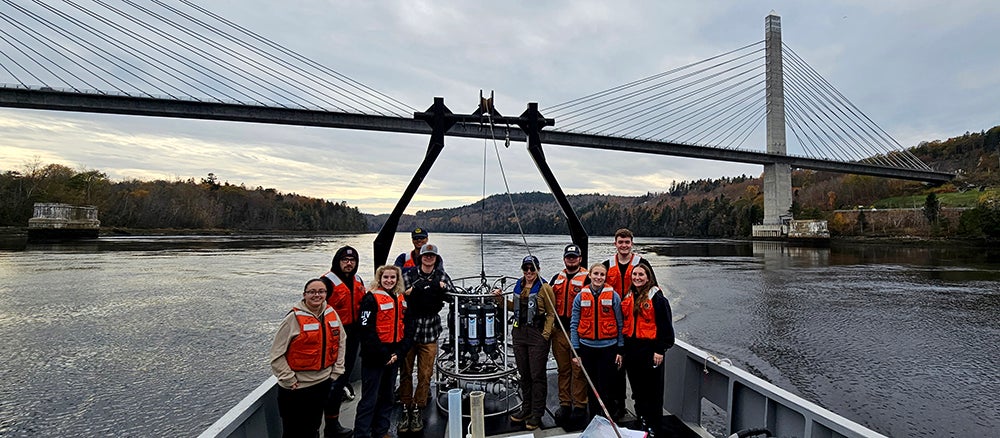
Ships, Seawater and Motivated Students
GSO alums drawn by the prospect of teaching at a primarily undergraduate institution with an opportunity for marine research often gravitate towards maritime academies. “That it would be at a maritime academy—with a research vessel, waterfront location, and running seawater in the lab—was exciting,” says Joceline Boucher, Ph.D.’91.
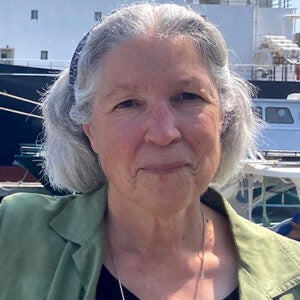
She was hired in 1991 for the marine science faculty at the new Corning School of Ocean Studies at Maine Maritime Academy, where she helped build this program.
The academy had its challenges, though, since female enrollment was less than 1% in 1991, and there were some faculty who didn’t think women belonged on ships. Boucher spent much time serving on committees to try to improve the campus climate. Progress was slow but helped pave the way.
One of those who benefitted from her work is Carey Friedman, Ph.D.’10, who joined Boucher at the Corning School in 2015. Friedman notes that the gender gap has narrowed over the last 30 years, and now the female enrollment is about 15% academy-wide, while in the Corning School women are predominant in both student enrollment (85%) and the faculty (seven of nine).
Both Friedman and James H. McKenna, Ph.D.’96, agree with Boucher on the importance of teaching in conjunction with, as Friedman said, “getting the marine science students comfortable with being on the water from day one.” In 2000, McKenna joined Boucher on the faculty of the Corning School, left in 2010 to become the coordinator for Maine Sea Grant and in 2020 was hired as the dean of undergraduate studies by Massachusetts Maritime.
Kerry Whittaker, Ph.D. ’14, whose previous work has taken her around the globe with Sea Education Association, particularly appreciates the proximity to Penobscot Bay and how easy it is to take students out on ships. She applied for a visiting position in the pandemic year of 2020, and developed a new program— the coastal and marine environmental science major—within the Corning School where she is now an assistant professor.
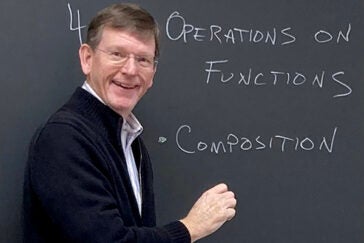
Living and working in Maine was also an important consideration for Friedman and David Avery, M.S. ’93, Ph.D. ’00, who was hired in 2011 and is an associate professor of mathematics and chair of the department of arts and sciences. “As a native Mainer, I am really excited to be a part of science education taking place in Maine,” Friedman says.
Further south at Massachusetts Maritime Academy, the balance of teaching and research is equally important. Heather Schrum Burton, Ph.D.’09, who joined the faculty in 2012, said “Today I spent my morning on our 35-foot research vessel with my marine science students. In my mind, it doesn’t get much better than that.” In addition to teaching, in 2022, she became chair of the Marine Science, Safety and Environmental Protection Department.
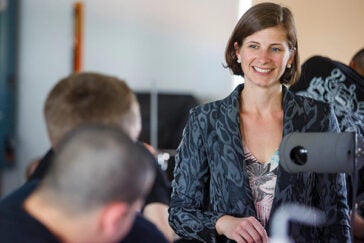
Haley McMurray, M.S. ’08, also became a faculty member in 2012, going to full-time in 2022. She’s now working toward her Ed.D. from Northeastern University. Both Burton and McMurray describe their students as “hardworking,” “very respectful,” “motivated” and “serious.”
Prepared for Maritime Academies
GSO alums have unique graduate school experiences that specifically prepared them for teaching and marine research. Boucher worked with her major professor, Michael Pilson, to plan chemical oceanography “Jiffy Cruises” in Narragansett Bay. “What I learned making station plans, planning way points, ensuring we had the necessary equipment on board, and writing cruise reports enabled me to then lead effective teaching cruises and to create cruise-based courses.”
Whittaker’s major professor, Tatiana Rynearson, and others helped her go on research cruises around the world including the Gulf of Mexico, Hawaii Ocean Time Series, Antarctica and off the coast of Alaska. She notes her work “guided my love for seagoing field work and the desire to share marine research experiences with my students.”
“Research cruises to the Equatorial Pacific, South Pacific Gyre, and Bering Sea were enormously helpful in preparing me for a career at a maritime academy,” says Burton, who thanks her major professor, Art Spivak, and also professor Steve D’Hondt.
“While at GSO I worked at the University-National Oceanographic Laboratory System [UNOLS] and went out on several cruises,” says Avery, who now concentrates on teaching math and computer programming. “This knowledge of ships and life at sea makes me able to understand what our students are learning in the rest of their studies.”
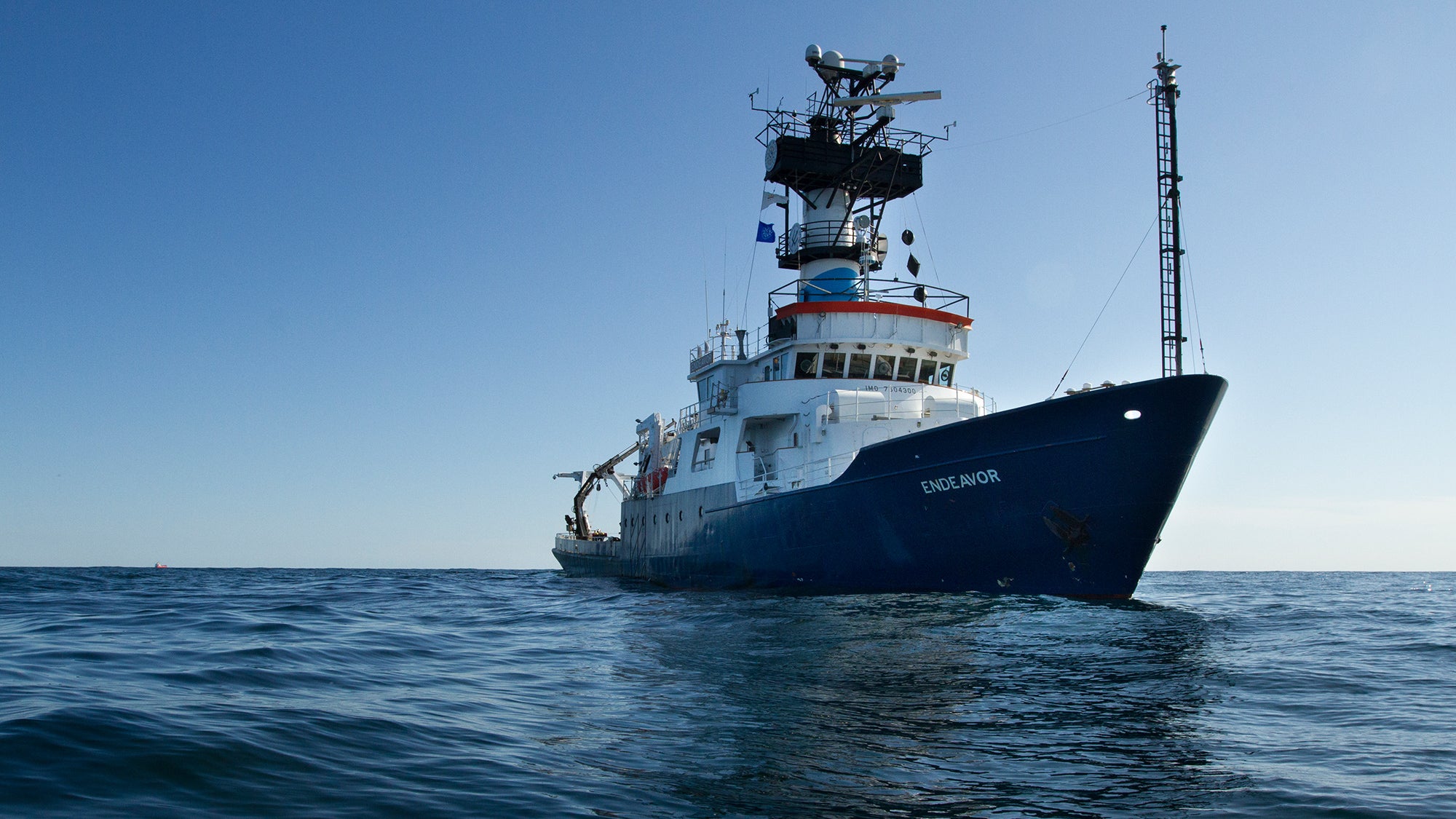
R/V Endeavor continues to be crewed by many maritime academy graduates:
U.S. Merchant Marine Academy
Daniel Alexander, Port Engineer
Steven Beuth, Relief Captain
Tom Glennon, Asst. Port Engineer
Olivia Harris, Asst. Engineer
SUNY Maritime Academy
Valmont Reichl, AB/Mate
Maine Maritime Academy
Christopher Baker, Relief Chief Engineer
Rhett McMunn, Captain (1982-2020)
Massachusetts Maritime Academy
Christopher Armanetti, Master (2020-present)
Brendan Thornton, Port Captain
Robert Queisser, Chief Engineer
GSO alums teach a variety of science courses at the maritime academies, ranging from general chemistry and oceanography to marine pollution and global environmental change—topics academy graduates need whether they go into careers in marine science or as crew on a ship. Some courses cover practical material such as the chemistry of avoiding oxidation of metals, how batteries work, and diagnosing and fixing boiler-water quality issues. Whittaker points out that it’s important to help students acquire skills in practical problem solving while also encouraging them to “think outside the box to develop solutions.”
The graduates working at maritime academies agree that the GSO experience goes beyond formal education, instilling values of networking, leadership and camaraderie. “I think the true gem of GSO is that the people there—faculty, students and staff alike—nurture curiosity, encourage inquiry, and give students the experience they need to go off and do whatever they want to do, knowing they can be successful,” Friedman says.
